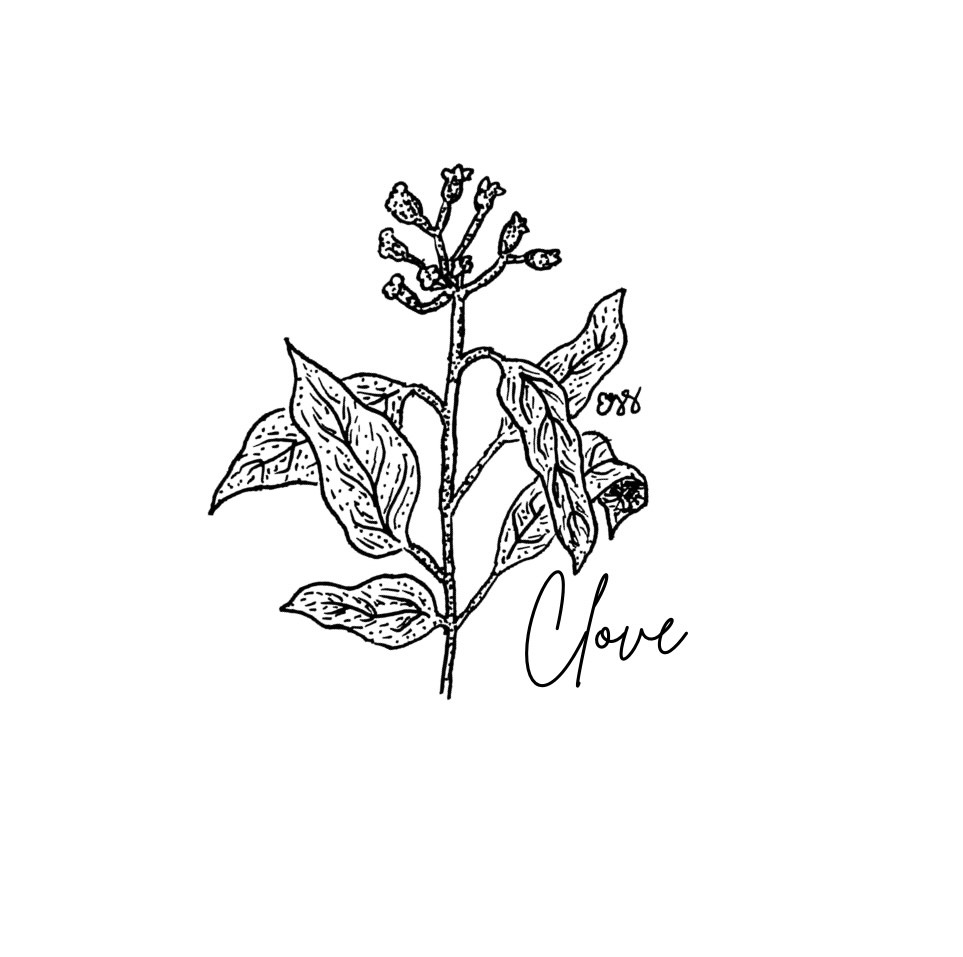Botanical of the Month: November

November Healing Plant: Clove (Syzygium aromaticum)
Doterra Essential Oil: Clove
Rishi Tea: Masala Chai
In the language of flowers, clove stands for dignity, being worthy of honor and self-respect. This makes me want to keep a steady supply of fresh cut clove flowers in every room. This would be quite a challenge in Pittsburgh though, as clove trees, native to the Molucca “Spice Islands” of Indonesia, only grow in tropical environments, takes 8 years for a first harvest, and 20 years to reach maturity! Cloves are actually the unopened flower buds of the clove tree. This “flower spice” must be harvested with the greatest care, by hand, just before the buds open, and then dried by experienced growers on palm mats in the sun for 4-5 days, which turns them the familiar brown color they have when we purchase them. Fitting that a spice requiring such careful handling would signify human dignity, something never to be mishandled. Interestingly, I also found clove can mean loving someone without that person knowing. How many times has a person buried feelings of love for someone else, so as not to appear undignified?
Derived from the Latin word “clovis,” meaning nail, dried clove flower buds resemble the shape of nails, making them ideal for studding orange pomanders. And, as the second part of the Latin name, “aromaticum,” says, they are highly aromatic. Known for its mouth cleansing abilities, you will often find clove in toothpastes and mouthwashes. Records from China’s Han Dynasty, in 202 B.C.E., show that anyone who came to see the emperor was actually required to chew cloves to sweeten their breath, before they saw him. The next time you are in front of someone with bad breath, try handing them a clove. Ok, so it sounds like an awkward moment, but doesn’t have to be! Lots of people get bad breath. It may actually spark an interesting clove conversation.
Archeological remnants have been found dating culinary uses for clove all the way back to 1700 B.C.E. Mexican, African and Middle Eastern cooking all have multiple uses for cloves and, as an essential spice in Indian cooking, it’s one of the standard ingredients in garam masala, chutney and curries. It can be found in teas, as a mulling spice, in countless baked goods, and is an integral part of chai-the popular spicy Indian tea with cardamom, cinnamon, ginger, black pepper and black tea. Medicinally, it can be chewed or taken as a tea for a digestive aid. Ironically though, after making so many foods taste great, clove oil is actually used in dentistry as a numbing agent for toothaches, and has even been included in tooth fillings for ongoing pain relief!
Around the fall and winter holidays, you will often see interesting designs of cloves studding orange pomanders. As the orange dries, it releases its delicate and spicy aroma. During the Middle Ages, these pomanders were actually used as herbal amulets worn around the neck, or placed around the home, as protection from negativity, harm and jealousy. Herbs and spices were put in cloth bags or perforated boxes to ward off viruses, bacteria or illness, as well as in hopes of bringing strength and good fortune. Clove folklore says that when cloves are worn or carried in a pocket, they will attract the opposite sex, or, when worn or carried by someone who has suffered emotional loss and is bereaved, they will provide comfort. When burned as incense, it is said to stop people from gossiping about you. And, sucking on 2 whole cloves without chewing or swallowing supposedly curbs the desire for alcohol. Strangely enough, each one of these scenarios, should they come true, could easily influence a person’s sense of dignity. That said, no matter how you choose to use this fascinating spice, may it always keep you dignified.
